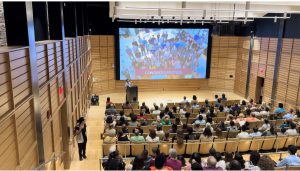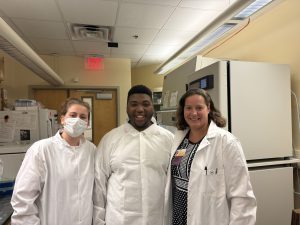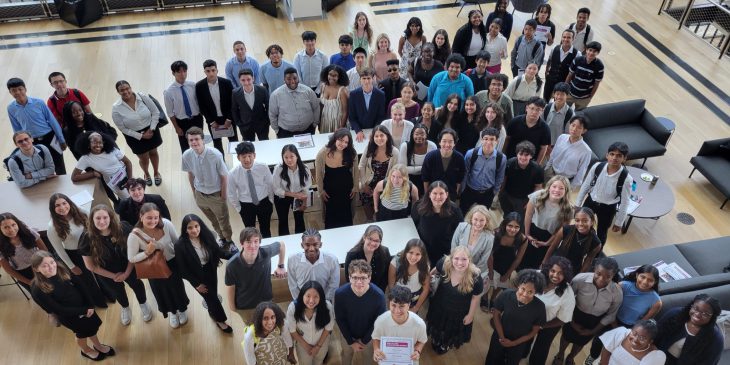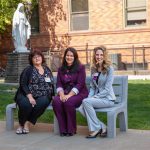While most teens spend their summer months free from the classroom, that wasn’t the case for more than 80 high school and six undergraduate college students entrenched in a cancer laboratory working on scientific research. The students were part of the 16th annual class of the UPMC Hillman Cancer Center Academy.
The eight-week immersive program pairs students with faculty mentors who guide them in a specific cancer research project at one of 77 laboratories across the University of Pittsburgh, UPMC Hillman Cancer Center and Magee-Womens Research Institute. The principal investigators and lab members volunteer to mentor one or two students, each of whom spends 30 to 35 hours a week on an assigned research project.

“To have students come in and do bench research is quite unique because across the United States there are few, if any, programs where high school students can truly immerse themselves in cancer research,” said Tullia Bruno, Ph.D. “This program allows them to understand what it’s like to be a true scientist for a full summer.”
Zacharias Barron, a rising senior at Woodland Hills High School worked in the lab of UPMC Hillman osteosarcoma survivor, surgeon and researcher, Dr. Kurt Weiss. While he admits he was confused at the start, Barron said he began to realize the importance of the research and understand the impact it may have on young adults in the future.
“My project involved looking at different gene expressions for this rare cancer that mostly affects kids who are my age,” said Barron. “Being in a lab and being able to work on this made me feel that what I was doing is meaningful and that I may be able to help kids live a better life and survive this cancer.”
“Zach is a student who was never in a lab before and it was so fun to watch him grow through this experience where he gained confidence and a true understanding of cancer research,” said Ines Lohse, Ph.D., co-director of Pitt’s Musculoskeletal Oncology Laboratory.

Zacharias Barron, center. “My project involved looking at different gene expressions for this rare cancer that mostly affects kids who are my age,” said Barron. “Being in a lab and being able to work on this made me feel that what I was doing is meaningful and that I may be able to help kids live a better life and survive this cancer.”
Returning for a third year was Tian LeGrande, a rising sophomore at Carnegie Mellon University, who continues her work in head and neck squamous cell carcinoma under the direction of neuroscientist Dr. Nicole Scheff.
“Going into undergrad with research experience was such an amazing opportunity and it actually helped me a lot in my college coursework,” said LeGrande. “It can feel overwhelming at first, but the mentors are here to help, and I have been so proud to see what I have been able to accomplish at the Hillman Academy.”
On the final day of the Academy, each student prepares a presentation complete with statistics, graphs and photos with the hypothesis and conclusion of their research, just as all cancer researchers present at professional scientific conferences. Attending are their lab members, UPMC Hillman and Pitt mentors, other faculty, students and family members.
That’s where Seneca Valley High School biology teacher Tom Lavelle came to see the progress of the four Seneca Valley students who were accepted into the program this year. Lavelle is also the director of the district’s center for biotechnology and a proponent of the Hillman Academy program.
“The Hillman Academy is a wonderful opportunity that provides students with real-world experience, which is almost impossible for these kids to get in a classroom,” said Lavelle. “Seeing what they’re presenting has been incredible and such a rare opportunity.”
Eric Chen, rising senior at Seneca Valley worked in the lab of Dr. Evan Delgado, a liver cancer researcher. “Currently I am planning to go to medical school but seeing this kind of research experience has allowed me to debate my options and becoming a researcher is on my list for what I might become,” said Chen.
Julia Lipscomb, a recent Seneca Valley graduate worked in the lab of molecular pathologist Dr. Anna Lokshin on cancer biomarkers. “I’ll be at Penn State in the fall, and I am going to take everything I learned from here to any lab I work in the future,” she said. “Right now, I am thinking medical school, but I have also debated going into research based on my experiences with this program.”
Hillman Academy director David Boone, Ph.D., says the overall program goal is to make cancer research available to all students – free of charge – regardless of their background or experience in scientific laboratories. Academy leaders look to expose a diverse student population who may continue in the sciences and become more representative of the patient population being treated at UPMC Hillman Cancer Center and other health systems in the country.
“We know that over 90% of our Academy students matriculate in STEM fields through college and 25% of them will continue in post undergraduate work in Ph.D. or M.D. programs,” said Boone. “We are hoping that the exposure at a young age may lead to a career they want to pursue or, at the least, to provide the connections, network and knowledge to help get them to where they want to go.”
More information on the Hillman Academy can be found here.









